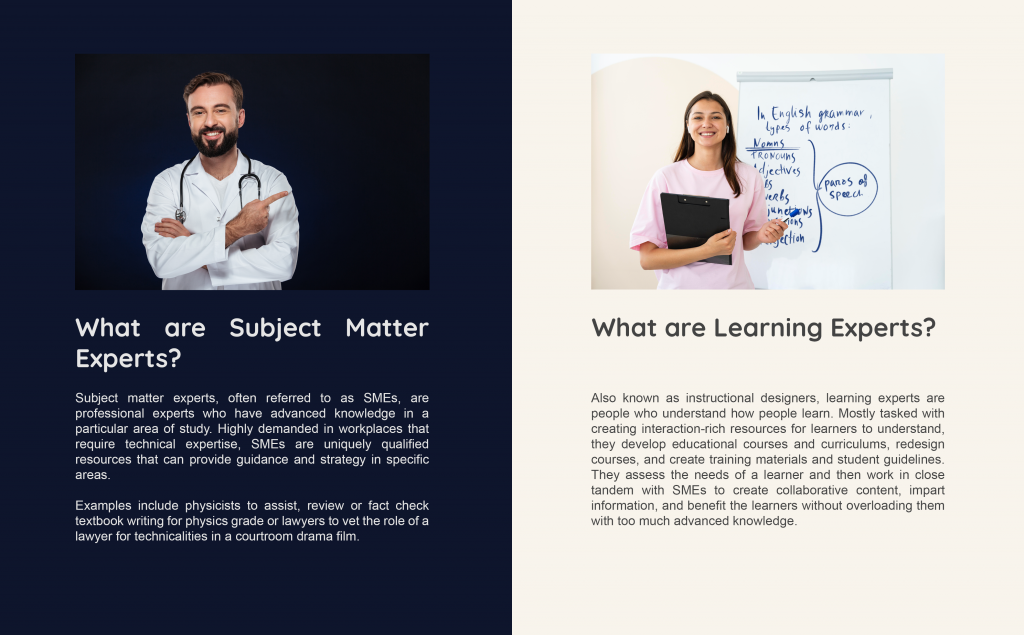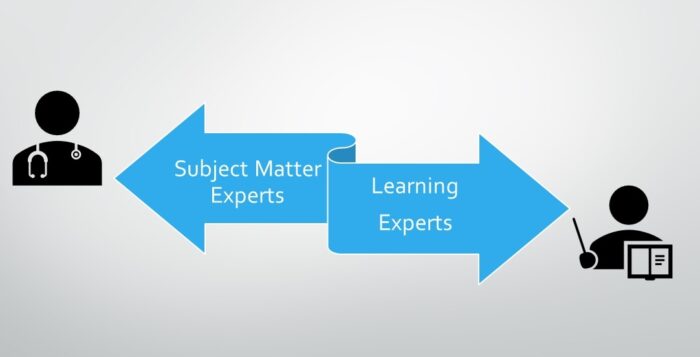If you are in the education space, you would often come across terminologies like ‘subject matter experts’, ‘instructional designer’, and ‘learning experts’. But have you ever understood the exact difference between the three? Bearing a close similarity in the nature of their fields, the three terms can often be confused for one. As an educator or even someone working in the education space, we thought it was imperative you know the distinction. This blog explains the difference between SMEs and Learning Experts and explores the fine line between them. Read on to find out more.

Striking the Right Balance: SMEs v/s Learning Experts
Point 1:
Subject matter experts have a high talent and affinity for their subjects. However, learners may or may not be able to follow the guidelines or the syllabi listed by the SMEs.
To straighten out these creases, a Learning Expert who helps bridge the gap between SMEs and learners is considered.
How Does a Learning Expert Work:
- They take complex and comprehensive subject matter from subject matter experts and break it down into a series of steps of easier ‘building blocks’ that learners can comprehend, understand, and learn from.
- Find out case studies and real world examples to illustrate a theoretical concept better.
- In some cases, they also highlight the practical benefits and personal gains for the learners, which help the learners look at the topic objectively.
Point 2:
Subject matter experts hold a far more nuanced knowledge of a subject than a regular instructor, but sometimes, there is not a requirement of in-depth explanation of topics. Other times, internal factors like time restrictions and deadlines do not permit over investing in detailed information.
This issue is also resolved with the help of instructional designers who are hired to explain the topic at hand (mostly relevant in case of school students) in an easy and quick manner. Learning experts may not have advanced mastery over a subject but they definitely know the nuances and have the skillset to illustrate key concepts.
How Does a Learning Expert Work:
- Focus on the key topics and concepts while illustrating or explaining a topic.
- Focus on leveraging the maximum time that is allocated, keeping in mind the organization’s goals and the learner’s interest.
Point 3:
Subject matter experts often consider their job to transmit information. However, learning experts balance the knowledge between pure information and real application. For example, a subject matter expert may explain a simple concept of physics like refraction through complex equations, theorems, and formula derivations, but a learning expert is most likely to demonstrate the same concept through real life examples and demonstrations.
After listing the above points, it is only clear that subject matter experts and learning experts work well in coherence. While SMEs provide the reasoning and information behind technical concepts, instructional designers (or learning experts) help learners relate those difficult theorems from real life, thus making it easier for them to understand hard concepts and topics.














